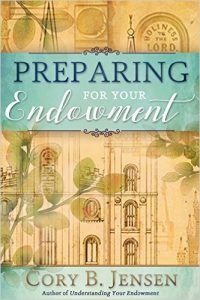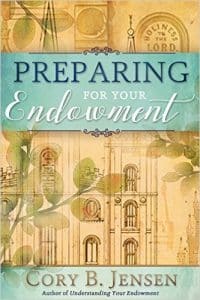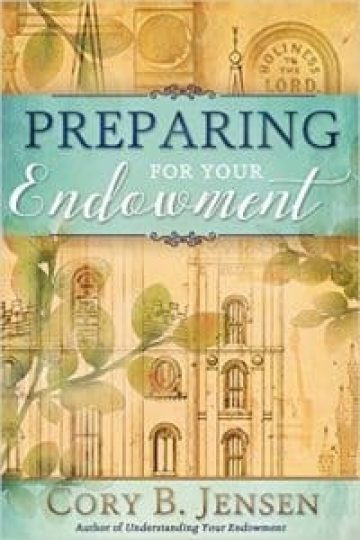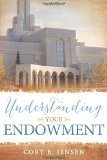 A little over a year ago, we reviewed Cory Jensen’s first book, Understanding Your Endowment. I really like this book– I bought it as a gift for friends, and so was very happy when I learned he was writing another book, and even happier after I read the book! This new book and is also focused on the temple and it does not disappoint. Really a prequel to his first book, Preparing for Your Endowment is aimed at those who are preparing to go through the temple for the first time.
A little over a year ago, we reviewed Cory Jensen’s first book, Understanding Your Endowment. I really like this book– I bought it as a gift for friends, and so was very happy when I learned he was writing another book, and even happier after I read the book! This new book and is also focused on the temple and it does not disappoint. Really a prequel to his first book, Preparing for Your Endowment is aimed at those who are preparing to go through the temple for the first time.
Now, when I was preparing to go through the temple for their first time, I was given an antiquated book that I can;’t even recall the name. This book focused on ancient temple and to be honest, really confused me. It had a heavy emphasis on priest and men and just seemed like a really great paperweight. Even after I went through the temple, I saw no connection with that book and my experience. I’m not saying that book was bad, but it was not for me. I wish, I wish, I wish– I had this book at that time, This book is easy to read, and relate-able to young women as well as young men. It’s focus is not on mysterious ancient tradition, but rather on being prepared to be guided by the spirit throughout one’s life.
The book is divided into two sections: “Your Foundation” and “Your Temple Experience.” Each section contains six chapters and the end of each chapter includes either personal questions or additional reading which reflect the previous chapter’s emphasis. The questions and reading recommendations are made to reflect the reader’s interests and individual interpretation of the scriptures, Thus, rather than being a book that tells you about the temple, the book guides you to forming your own ideas, experiences and testimony of the temple. This is probably the most refreshing part of the book, and something that makes the book applicable to those who are preparing to go to the temple, those who are endowed, and even those who have not been to the temple in a while. This concept of personal development is heavily emphasis, indeed it is the focus of the introduction, where Jensen asks the golden question: why do you want to go to the temple?
This query, and the first chapter are aimed at helping the reader identify the factors in developing a testimony of the gospel, rather than an overt temple focus. Attention is given to the requirement of worthiness, but not in an overt way. Jensen’s personal stories and easy to read style remove the sense of cryptic messaging that often clutters reading materials intended to teach about the temple. It is a refreshingly basic way to begin one’s study of the temple, one which I appreciated very much.
Jensen does not include temple “spoilers,” but he addresses things discussed in the temple. He does by sharing his own experiences, but also with heavy emphasis on the scriptures. Rather than splitting hairs by quoting a variety of general authorities’ opinions about the temple (which may sometimes be inconsistent, pending the emphasis the General Authority is trying to make), Jensen sticks to what is taught and relaying in the scriptures, thereby allowing the reader to develop their own ideas, and in essence prepare themselves to attend the temple on a personal level.
Basics such as “Faith”, “Repentance”, and “Ordinances” are each given a chapter, without overtly laying on judgement. The writing is clear and simple, and it allows the reader to self-reflect in a healthy way. In addition, the book prepares the reader to seek for symbolism, rather than to settle on literal interpretation. This symbolism is addressed and discussed in a meaningful way, expressing the many layers one can find in scriptures, ordinances, and, of course, the temple. For example, pages 49-50 discuss four different symbolic meanings in relation to baptism. Each emblem is addressed without forcing the reader to choose the “right” meaning, which additionally prepares the reader to seek for layers of interpretation in all church ordinances.
I particularly enjoyed the chapter titled “Enduring to the End.” This is a treasure from that section:
Sometimes people have the mistaken idea that living the gospel allows us to avoid the trials and problems of life. Part of that misunderstanding may stem from scriptures that promise if we keep the commandments we shall all prosper in the land (see 2 Nephi 1:20 for example). These types of promises are sometimes misconstrued into a gospel of success mentality. It is the belief that the more righteous I am, the more success, money, happiness and so on that I will experience in life. But that’s a false premise and not what the scripture means. To prosper is to fulfill and succeed in our life’s mission; it is not a promise of life on easy street.
Oh, how I wish I would have read this paragraph when I was as a youth! I think I would’ve been easier on myself in trying to be as “righteous” as possible, and instead focused on maintaining my covenants and seeking my life’s mission rather than obsessing about the natural alcoholic content of over ripe bananas (I’m not kidding- a guy I was dating brought that up and we seriously discussed the word of wisdom in relation to bananas! Ugh!). This and many other sections allow the reader to focus on the big picture, rather than on the small stuff that in the end, may not lead one to find happiness or satisfaction in life.
Symbolism is specifically addressed in the second section of the book, and again, Jensen invited the reader to consider the value and place of symbolism in the gospel and in society. The thesis in this section is especially powerful—this section is worth ten times the investment in the book alone. The book discusses temple covenants and temple sealings in a way that easy to comprehend, and prepares the readers for the final chapters, each dealing with the love of God and the love of Christ.
After I first read this book, I had a copy of it sent to a friend and some family members. One of these individuals thanked me for sharing this book, and emphasized their specific appreciation chapter 11, “The Temple Reveals God’s Love.” This chapter truly is a treasure. It addresses the realities of temptation, imperfection and the complete love God has for us. This is an important chapter to read and I feel like I would be doing a disservice to share spoilers. Just go read it, already!
Jensen does not differentiate his work as being for men or women, nor does he prescribe any traditions or roles to the reader, making this book ideal for both young women and young men. This book is aimed at developing one’s relationship with their Heavenly Parents and Jesus Christ through the temple and by being prepared to partake of the temple. In the end, I high recommend this book for those who are preparing to attend the temple, or were confused by their temple experience, or honestly, anyone interested in gospel study (temple related or not).
One final fun fact? All proceeds of this book, like his fist book, go to Mentors International. Mentors International is a charitable organization with the goal of ending global poverty. Preparing For Your Endowment can be purchased on Amazon for $13.99
[amazonjs asin=”1462119654″ locale=”US” title=”Preparing for Your Endowment”]






5 Responses
Thanks! I’m going to get this!
Given the fact that most progressive female members claim to dislike or hate the temple experience, I’m a bit surprised this book gets any positive review at all. Did the author address any of the things that typically cause pain to sisters, like Eve covenanting with Adam, Eve not speaking through the remainder of the endowment, veiling during prayer circle, the perception that somehow a woman “gives” herself to the groom at sealing but the groom does not? Or, does he not address those issues at all, and encourage people to find their own interpretation of the things seen, said and done in the temple?
Yes and yes. Those types of concerns are not the primary focus of the book, however, recognizing that there are many who share them, I share a few thoughts that may be helpful or provide a different perspective. I would also encourage everyone to seek the Lord for help and for interpretation in our individual lives.
Thanks. I have followed many posts and comments both at Exponent and fMh where sisters claim they will never set foot in the temple again. Perhaps reading this book will encourage them to give the temple experience another try.
Idiat, following the publication of my first book, I was surprised by how many women have similar feelings to what you expressed. Probably the most gratifying thing to me since then is to hear from many who have written to say that the book helped them have a new perspective and to consider things in a different light. For some it has been very healing. A few have contacted me to discuss some concerns via email. I don’t pretend to have all the answers but am happy to share a few thoughts that may be helpful. You are welcome to reach me by email at cjensen at libertypioneer.com. Before doing so, however, please take time to read both books so we will be speaking from the same page.